ACC305: Evaluating Ethical Violations in Auditing Scenarios
VerifiedAdded on 2023/06/10
|8
|2285
|443
Report
AI Summary
This report provides a comprehensive analysis of ethical principles in auditing and the independence of auditors, referencing APES 110 Australian ethical standards. It examines several cases involving potential violations of ethical principles, including professional behavior, gifts and hospitality, sufficient expertise, independence in audit and review engagements, custody of client assets, and objectivity in all services. Each case is evaluated to determine whether a violation occurred and identifies the specific ethical principle breached. Furthermore, the report discusses threats to auditor independence, such as self-review, familiarity, and relationship threats, using specific scenarios to illustrate these concepts. The analysis includes implications of these threats and recommendations for maintaining auditor independence. The document concludes by emphasizing the importance of adhering to ethical guidelines to ensure the integrity and reliability of the auditing process. Desklib offers a range of study tools, including past papers and solved assignments, to support students in their academic pursuits.
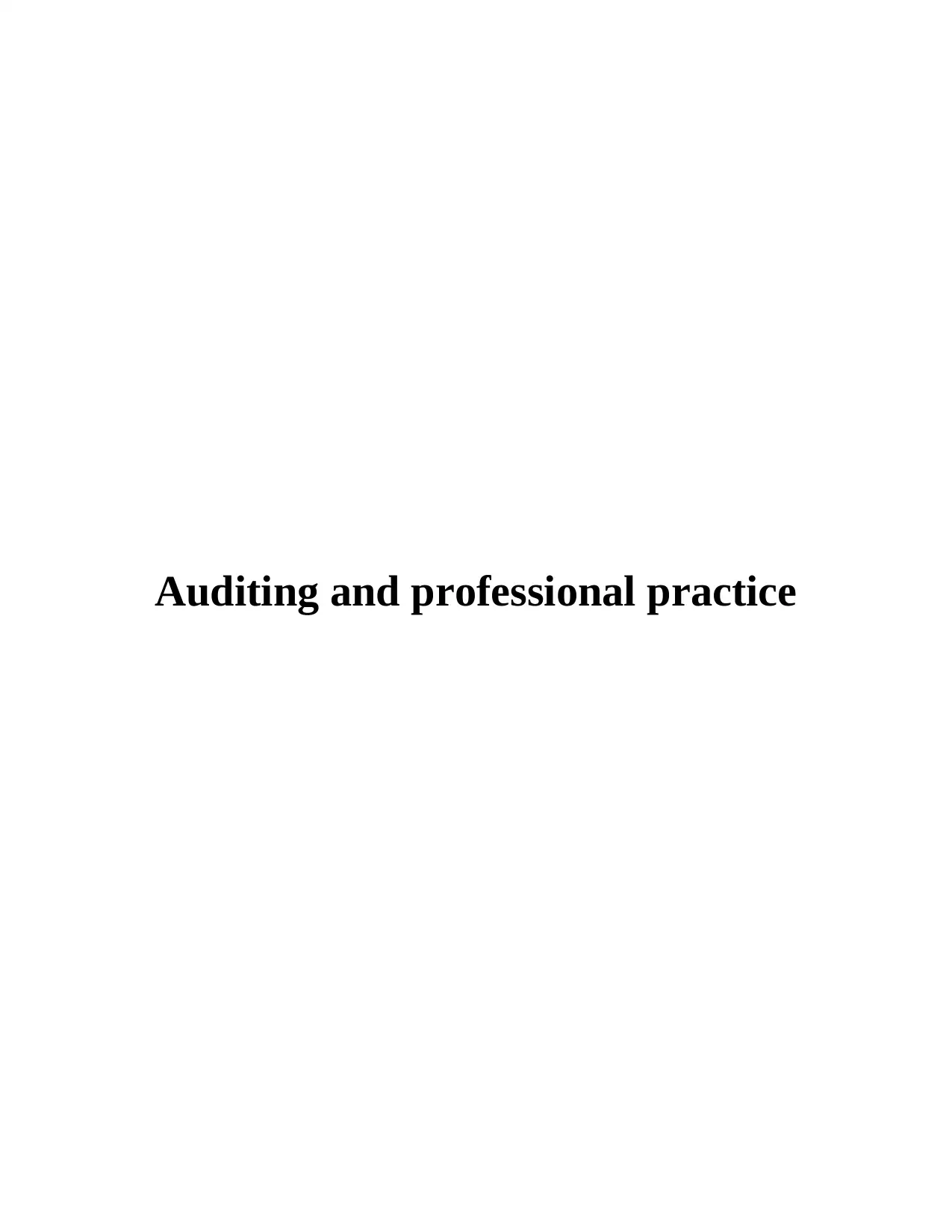
Auditing and professional practice
Paraphrase This Document
Need a fresh take? Get an instant paraphrase of this document with our AI Paraphraser
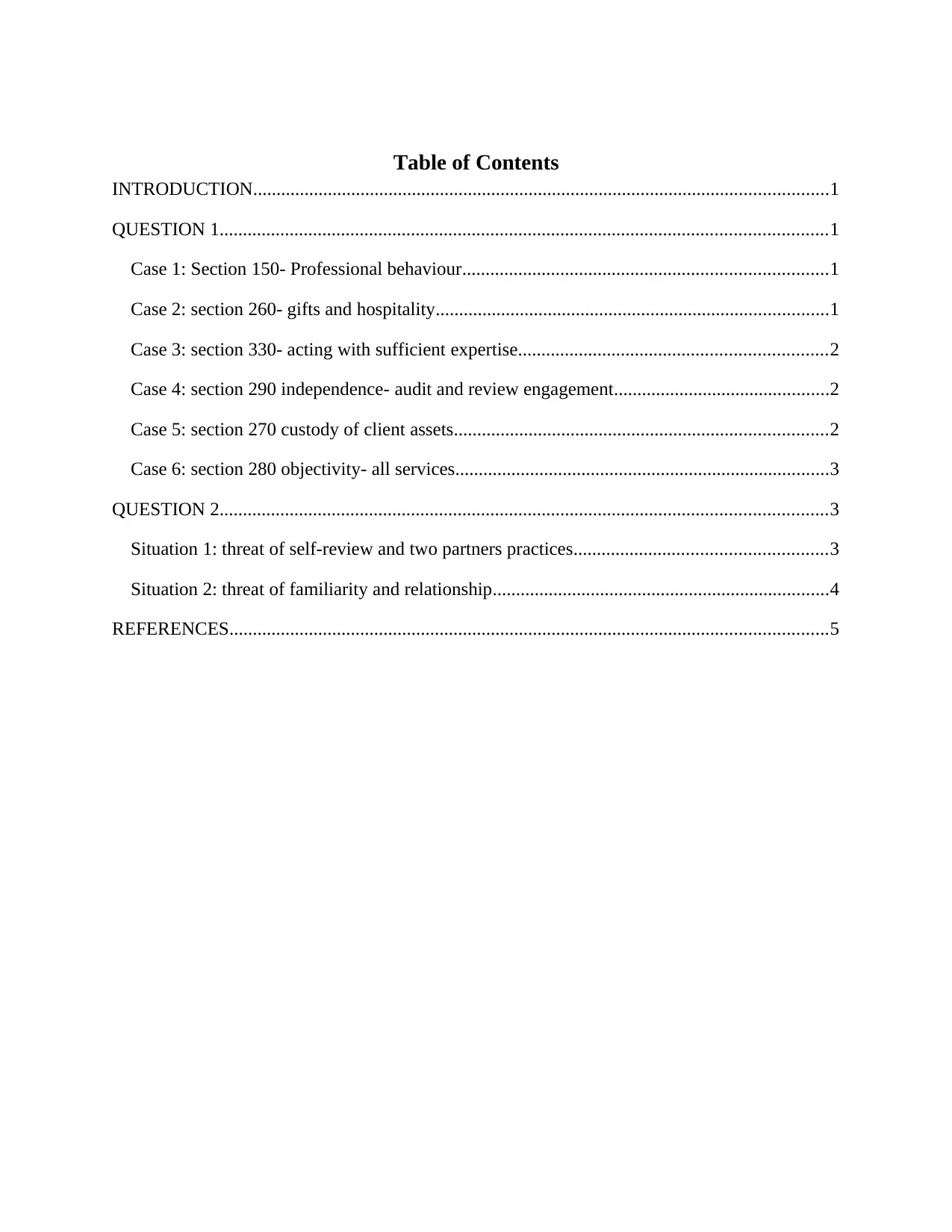
Table of Contents
INTRODUCTION...........................................................................................................................1
QUESTION 1..................................................................................................................................1
Case 1: Section 150- Professional behaviour..............................................................................1
Case 2: section 260- gifts and hospitality....................................................................................1
Case 3: section 330- acting with sufficient expertise..................................................................2
Case 4: section 290 independence- audit and review engagement..............................................2
Case 5: section 270 custody of client assets................................................................................2
Case 6: section 280 objectivity- all services................................................................................3
QUESTION 2..................................................................................................................................3
Situation 1: threat of self-review and two partners practices......................................................3
Situation 2: threat of familiarity and relationship........................................................................4
REFERENCES................................................................................................................................5
INTRODUCTION...........................................................................................................................1
QUESTION 1..................................................................................................................................1
Case 1: Section 150- Professional behaviour..............................................................................1
Case 2: section 260- gifts and hospitality....................................................................................1
Case 3: section 330- acting with sufficient expertise..................................................................2
Case 4: section 290 independence- audit and review engagement..............................................2
Case 5: section 270 custody of client assets................................................................................2
Case 6: section 280 objectivity- all services................................................................................3
QUESTION 2..................................................................................................................................3
Situation 1: threat of self-review and two partners practices......................................................3
Situation 2: threat of familiarity and relationship........................................................................4
REFERENCES................................................................................................................................5
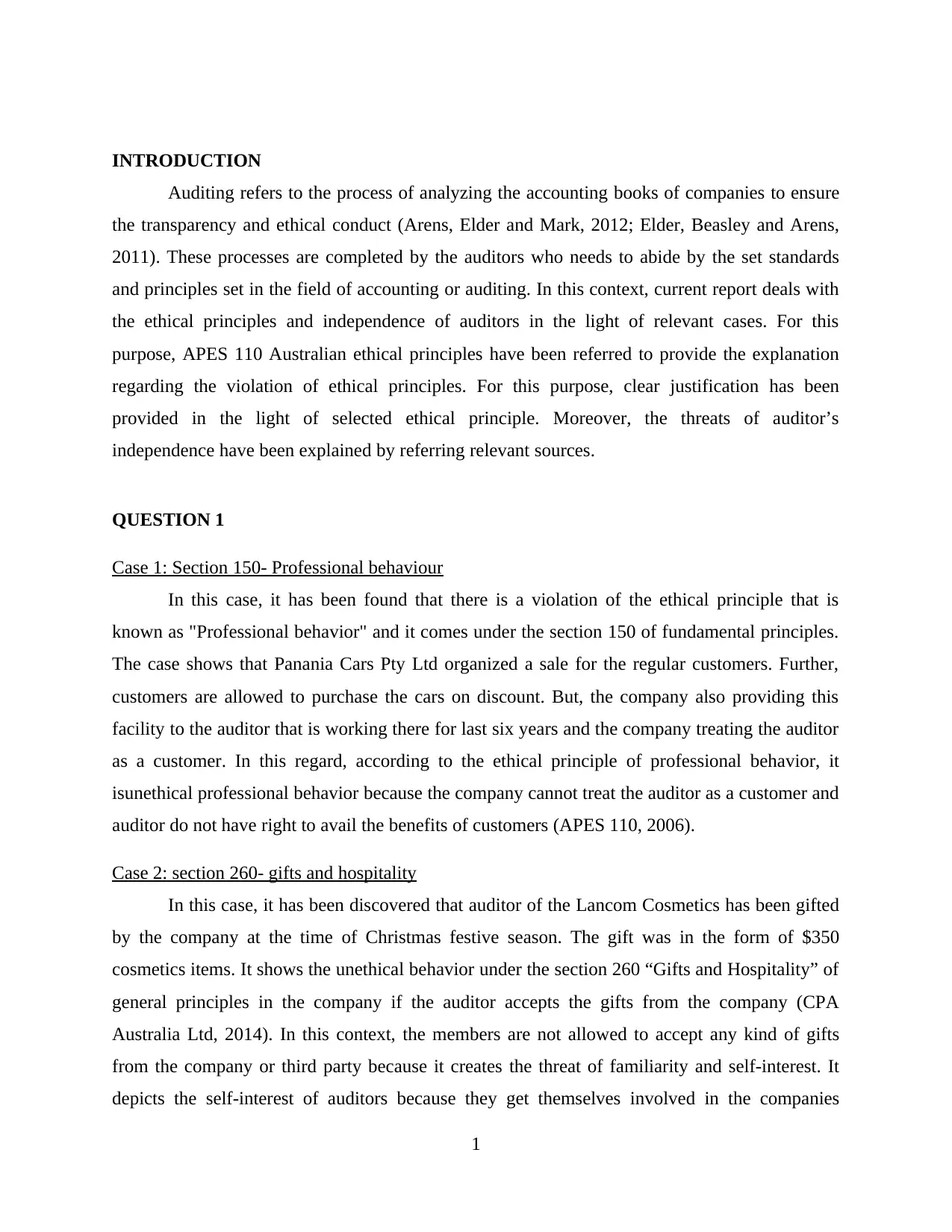
INTRODUCTION
Auditing refers to the process of analyzing the accounting books of companies to ensure
the transparency and ethical conduct (Arens, Elder and Mark, 2012; Elder, Beasley and Arens,
2011). These processes are completed by the auditors who needs to abide by the set standards
and principles set in the field of accounting or auditing. In this context, current report deals with
the ethical principles and independence of auditors in the light of relevant cases. For this
purpose, APES 110 Australian ethical principles have been referred to provide the explanation
regarding the violation of ethical principles. For this purpose, clear justification has been
provided in the light of selected ethical principle. Moreover, the threats of auditor’s
independence have been explained by referring relevant sources.
QUESTION 1
Case 1: Section 150- Professional behaviour
In this case, it has been found that there is a violation of the ethical principle that is
known as "Professional behavior" and it comes under the section 150 of fundamental principles.
The case shows that Panania Cars Pty Ltd organized a sale for the regular customers. Further,
customers are allowed to purchase the cars on discount. But, the company also providing this
facility to the auditor that is working there for last six years and the company treating the auditor
as a customer. In this regard, according to the ethical principle of professional behavior, it
isunethical professional behavior because the company cannot treat the auditor as a customer and
auditor do not have right to avail the benefits of customers (APES 110, 2006).
Case 2: section 260- gifts and hospitality
In this case, it has been discovered that auditor of the Lancom Cosmetics has been gifted
by the company at the time of Christmas festive season. The gift was in the form of $350
cosmetics items. It shows the unethical behavior under the section 260 “Gifts and Hospitality” of
general principles in the company if the auditor accepts the gifts from the company (CPA
Australia Ltd, 2014). In this context, the members are not allowed to accept any kind of gifts
from the company or third party because it creates the threat of familiarity and self-interest. It
depicts the self-interest of auditors because they get themselves involved in the companies
1
Auditing refers to the process of analyzing the accounting books of companies to ensure
the transparency and ethical conduct (Arens, Elder and Mark, 2012; Elder, Beasley and Arens,
2011). These processes are completed by the auditors who needs to abide by the set standards
and principles set in the field of accounting or auditing. In this context, current report deals with
the ethical principles and independence of auditors in the light of relevant cases. For this
purpose, APES 110 Australian ethical principles have been referred to provide the explanation
regarding the violation of ethical principles. For this purpose, clear justification has been
provided in the light of selected ethical principle. Moreover, the threats of auditor’s
independence have been explained by referring relevant sources.
QUESTION 1
Case 1: Section 150- Professional behaviour
In this case, it has been found that there is a violation of the ethical principle that is
known as "Professional behavior" and it comes under the section 150 of fundamental principles.
The case shows that Panania Cars Pty Ltd organized a sale for the regular customers. Further,
customers are allowed to purchase the cars on discount. But, the company also providing this
facility to the auditor that is working there for last six years and the company treating the auditor
as a customer. In this regard, according to the ethical principle of professional behavior, it
isunethical professional behavior because the company cannot treat the auditor as a customer and
auditor do not have right to avail the benefits of customers (APES 110, 2006).
Case 2: section 260- gifts and hospitality
In this case, it has been discovered that auditor of the Lancom Cosmetics has been gifted
by the company at the time of Christmas festive season. The gift was in the form of $350
cosmetics items. It shows the unethical behavior under the section 260 “Gifts and Hospitality” of
general principles in the company if the auditor accepts the gifts from the company (CPA
Australia Ltd, 2014). In this context, the members are not allowed to accept any kind of gifts
from the company or third party because it creates the threat of familiarity and self-interest. It
depicts the self-interest of auditors because they get themselves involved in the companies
1
⊘ This is a preview!⊘
Do you want full access?
Subscribe today to unlock all pages.

Trusted by 1+ million students worldwide
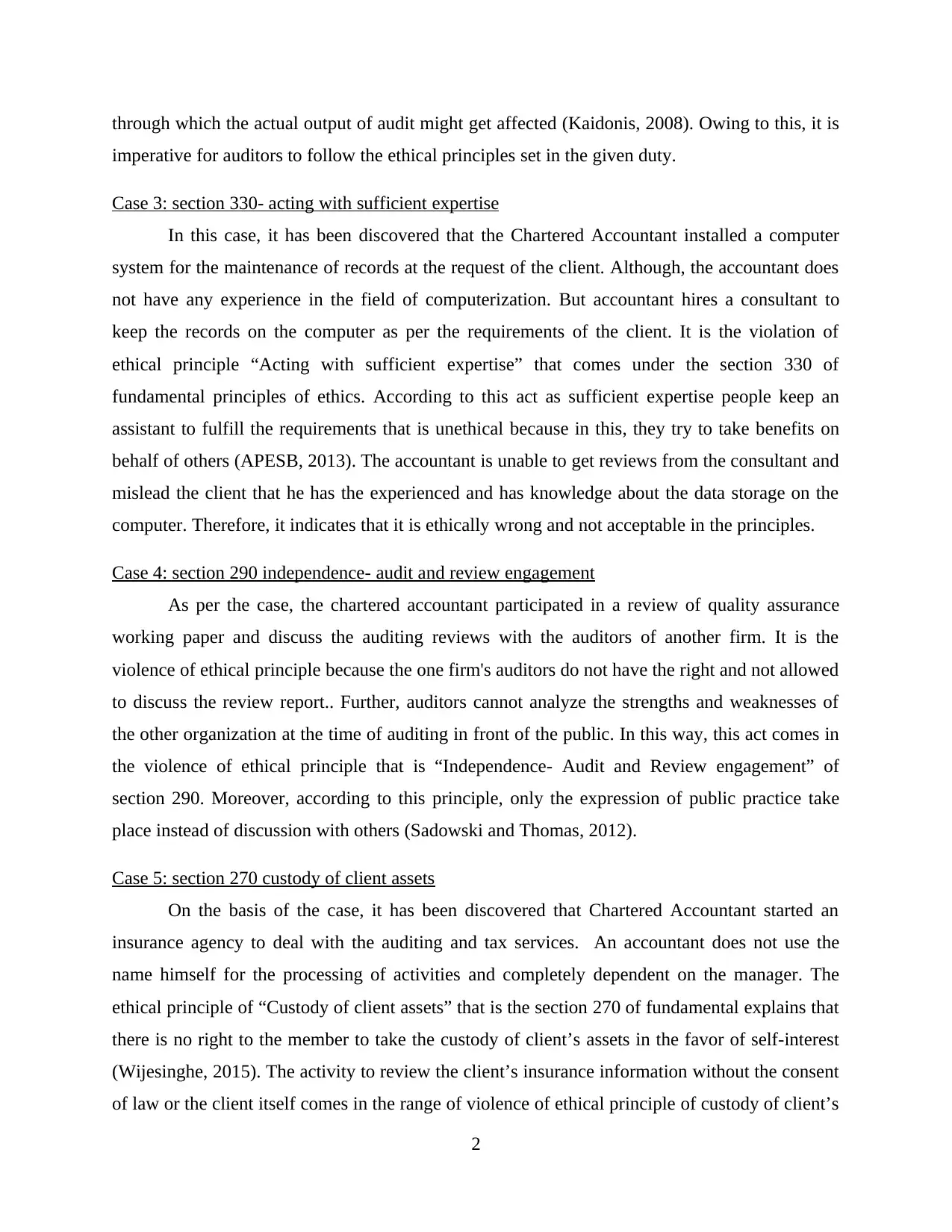
through which the actual output of audit might get affected (Kaidonis, 2008). Owing to this, it is
imperative for auditors to follow the ethical principles set in the given duty.
Case 3: section 330- acting with sufficient expertise
In this case, it has been discovered that the Chartered Accountant installed a computer
system for the maintenance of records at the request of the client. Although, the accountant does
not have any experience in the field of computerization. But accountant hires a consultant to
keep the records on the computer as per the requirements of the client. It is the violation of
ethical principle “Acting with sufficient expertise” that comes under the section 330 of
fundamental principles of ethics. According to this act as sufficient expertise people keep an
assistant to fulfill the requirements that is unethical because in this, they try to take benefits on
behalf of others (APESB, 2013). The accountant is unable to get reviews from the consultant and
mislead the client that he has the experienced and has knowledge about the data storage on the
computer. Therefore, it indicates that it is ethically wrong and not acceptable in the principles.
Case 4: section 290 independence- audit and review engagement
As per the case, the chartered accountant participated in a review of quality assurance
working paper and discuss the auditing reviews with the auditors of another firm. It is the
violence of ethical principle because the one firm's auditors do not have the right and not allowed
to discuss the review report.. Further, auditors cannot analyze the strengths and weaknesses of
the other organization at the time of auditing in front of the public. In this way, this act comes in
the violence of ethical principle that is “Independence- Audit and Review engagement” of
section 290. Moreover, according to this principle, only the expression of public practice take
place instead of discussion with others (Sadowski and Thomas, 2012).
Case 5: section 270 custody of client assets
On the basis of the case, it has been discovered that Chartered Accountant started an
insurance agency to deal with the auditing and tax services. An accountant does not use the
name himself for the processing of activities and completely dependent on the manager. The
ethical principle of “Custody of client assets” that is the section 270 of fundamental explains that
there is no right to the member to take the custody of client’s assets in the favor of self-interest
(Wijesinghe, 2015). The activity to review the client’s insurance information without the consent
of law or the client itself comes in the range of violence of ethical principle of custody of client’s
2
imperative for auditors to follow the ethical principles set in the given duty.
Case 3: section 330- acting with sufficient expertise
In this case, it has been discovered that the Chartered Accountant installed a computer
system for the maintenance of records at the request of the client. Although, the accountant does
not have any experience in the field of computerization. But accountant hires a consultant to
keep the records on the computer as per the requirements of the client. It is the violation of
ethical principle “Acting with sufficient expertise” that comes under the section 330 of
fundamental principles of ethics. According to this act as sufficient expertise people keep an
assistant to fulfill the requirements that is unethical because in this, they try to take benefits on
behalf of others (APESB, 2013). The accountant is unable to get reviews from the consultant and
mislead the client that he has the experienced and has knowledge about the data storage on the
computer. Therefore, it indicates that it is ethically wrong and not acceptable in the principles.
Case 4: section 290 independence- audit and review engagement
As per the case, the chartered accountant participated in a review of quality assurance
working paper and discuss the auditing reviews with the auditors of another firm. It is the
violence of ethical principle because the one firm's auditors do not have the right and not allowed
to discuss the review report.. Further, auditors cannot analyze the strengths and weaknesses of
the other organization at the time of auditing in front of the public. In this way, this act comes in
the violence of ethical principle that is “Independence- Audit and Review engagement” of
section 290. Moreover, according to this principle, only the expression of public practice take
place instead of discussion with others (Sadowski and Thomas, 2012).
Case 5: section 270 custody of client assets
On the basis of the case, it has been discovered that Chartered Accountant started an
insurance agency to deal with the auditing and tax services. An accountant does not use the
name himself for the processing of activities and completely dependent on the manager. The
ethical principle of “Custody of client assets” that is the section 270 of fundamental explains that
there is no right to the member to take the custody of client’s assets in the favor of self-interest
(Wijesinghe, 2015). The activity to review the client’s insurance information without the consent
of law or the client itself comes in the range of violence of ethical principle of custody of client’s
2
Paraphrase This Document
Need a fresh take? Get an instant paraphrase of this document with our AI Paraphraser
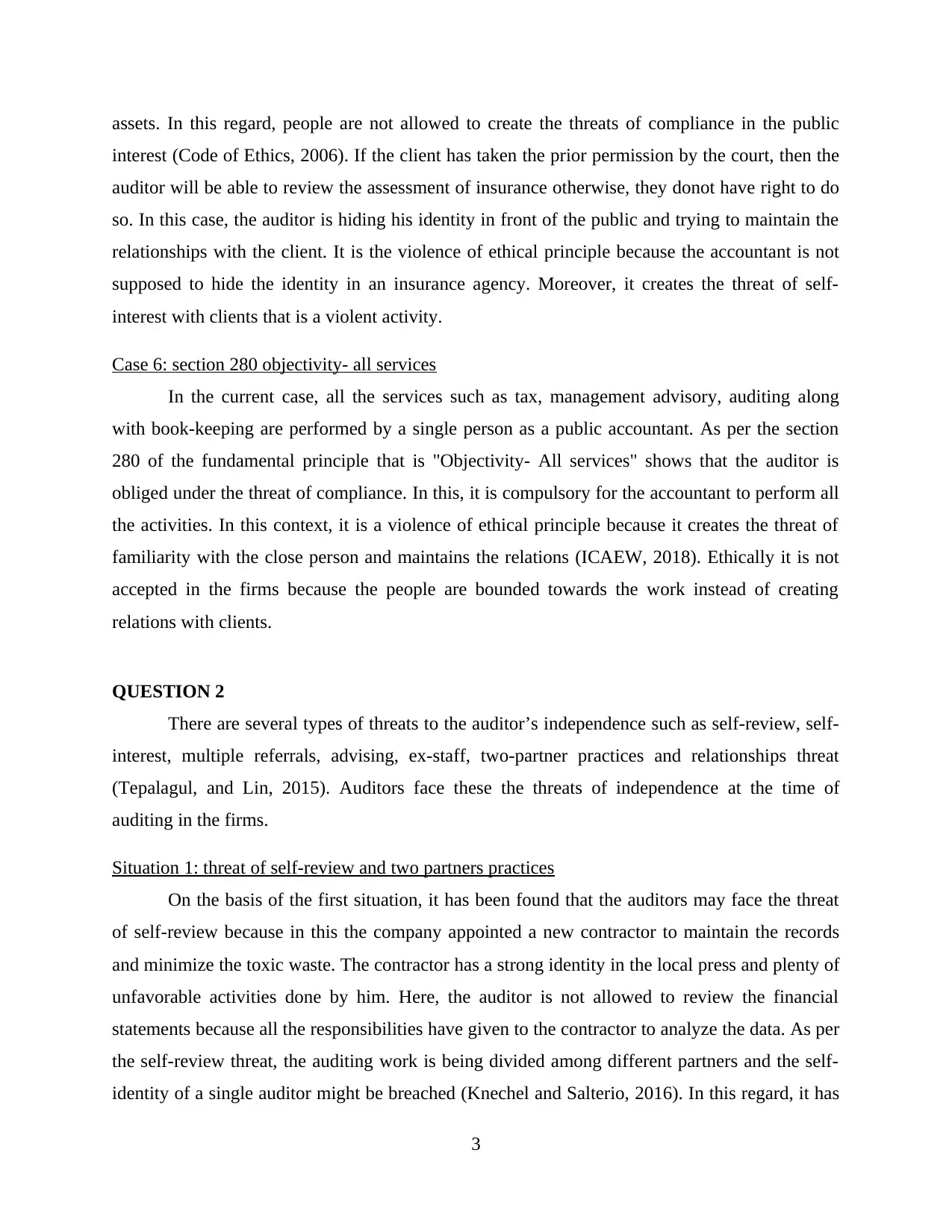
assets. In this regard, people are not allowed to create the threats of compliance in the public
interest (Code of Ethics, 2006). If the client has taken the prior permission by the court, then the
auditor will be able to review the assessment of insurance otherwise, they donot have right to do
so. In this case, the auditor is hiding his identity in front of the public and trying to maintain the
relationships with the client. It is the violence of ethical principle because the accountant is not
supposed to hide the identity in an insurance agency. Moreover, it creates the threat of self-
interest with clients that is a violent activity.
Case 6: section 280 objectivity- all services
In the current case, all the services such as tax, management advisory, auditing along
with book-keeping are performed by a single person as a public accountant. As per the section
280 of the fundamental principle that is "Objectivity- All services" shows that the auditor is
obliged under the threat of compliance. In this, it is compulsory for the accountant to perform all
the activities. In this context, it is a violence of ethical principle because it creates the threat of
familiarity with the close person and maintains the relations (ICAEW, 2018). Ethically it is not
accepted in the firms because the people are bounded towards the work instead of creating
relations with clients.
QUESTION 2
There are several types of threats to the auditor’s independence such as self-review, self-
interest, multiple referrals, advising, ex-staff, two-partner practices and relationships threat
(Tepalagul, and Lin, 2015). Auditors face these the threats of independence at the time of
auditing in the firms.
Situation 1: threat of self-review and two partners practices
On the basis of the first situation, it has been found that the auditors may face the threat
of self-review because in this the company appointed a new contractor to maintain the records
and minimize the toxic waste. The contractor has a strong identity in the local press and plenty of
unfavorable activities done by him. Here, the auditor is not allowed to review the financial
statements because all the responsibilities have given to the contractor to analyze the data. As per
the self-review threat, the auditing work is being divided among different partners and the self-
identity of a single auditor might be breached (Knechel and Salterio, 2016). In this regard, it has
3
interest (Code of Ethics, 2006). If the client has taken the prior permission by the court, then the
auditor will be able to review the assessment of insurance otherwise, they donot have right to do
so. In this case, the auditor is hiding his identity in front of the public and trying to maintain the
relationships with the client. It is the violence of ethical principle because the accountant is not
supposed to hide the identity in an insurance agency. Moreover, it creates the threat of self-
interest with clients that is a violent activity.
Case 6: section 280 objectivity- all services
In the current case, all the services such as tax, management advisory, auditing along
with book-keeping are performed by a single person as a public accountant. As per the section
280 of the fundamental principle that is "Objectivity- All services" shows that the auditor is
obliged under the threat of compliance. In this, it is compulsory for the accountant to perform all
the activities. In this context, it is a violence of ethical principle because it creates the threat of
familiarity with the close person and maintains the relations (ICAEW, 2018). Ethically it is not
accepted in the firms because the people are bounded towards the work instead of creating
relations with clients.
QUESTION 2
There are several types of threats to the auditor’s independence such as self-review, self-
interest, multiple referrals, advising, ex-staff, two-partner practices and relationships threat
(Tepalagul, and Lin, 2015). Auditors face these the threats of independence at the time of
auditing in the firms.
Situation 1: threat of self-review and two partners practices
On the basis of the first situation, it has been found that the auditors may face the threat
of self-review because in this the company appointed a new contractor to maintain the records
and minimize the toxic waste. The contractor has a strong identity in the local press and plenty of
unfavorable activities done by him. Here, the auditor is not allowed to review the financial
statements because all the responsibilities have given to the contractor to analyze the data. As per
the self-review threat, the auditing work is being divided among different partners and the self-
identity of a single auditor might be breached (Knechel and Salterio, 2016). In this regard, it has
3
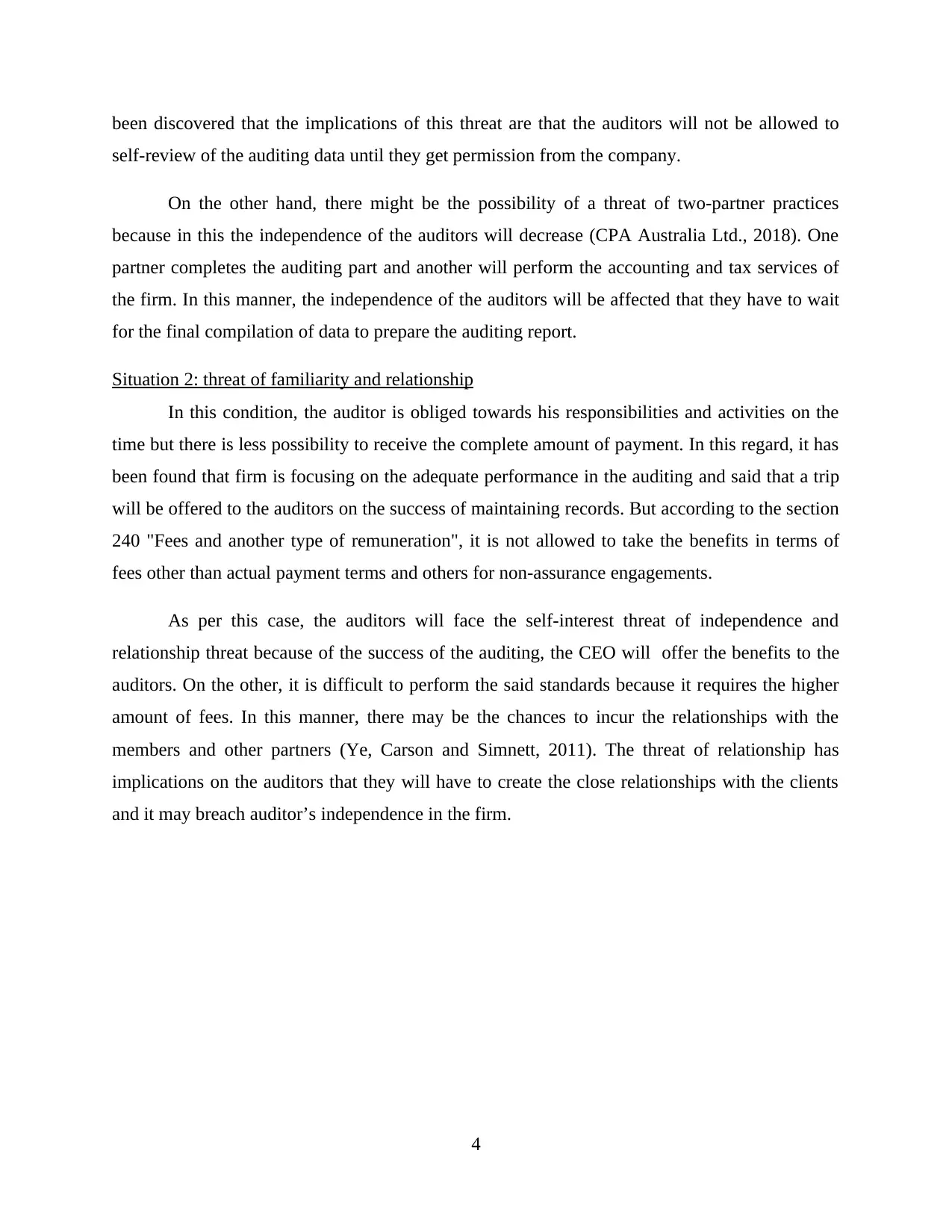
been discovered that the implications of this threat are that the auditors will not be allowed to
self-review of the auditing data until they get permission from the company.
On the other hand, there might be the possibility of a threat of two-partner practices
because in this the independence of the auditors will decrease (CPA Australia Ltd., 2018). One
partner completes the auditing part and another will perform the accounting and tax services of
the firm. In this manner, the independence of the auditors will be affected that they have to wait
for the final compilation of data to prepare the auditing report.
Situation 2: threat of familiarity and relationship
In this condition, the auditor is obliged towards his responsibilities and activities on the
time but there is less possibility to receive the complete amount of payment. In this regard, it has
been found that firm is focusing on the adequate performance in the auditing and said that a trip
will be offered to the auditors on the success of maintaining records. But according to the section
240 "Fees and another type of remuneration", it is not allowed to take the benefits in terms of
fees other than actual payment terms and others for non-assurance engagements.
As per this case, the auditors will face the self-interest threat of independence and
relationship threat because of the success of the auditing, the CEO will offer the benefits to the
auditors. On the other, it is difficult to perform the said standards because it requires the higher
amount of fees. In this manner, there may be the chances to incur the relationships with the
members and other partners (Ye, Carson and Simnett, 2011). The threat of relationship has
implications on the auditors that they will have to create the close relationships with the clients
and it may breach auditor’s independence in the firm.
4
self-review of the auditing data until they get permission from the company.
On the other hand, there might be the possibility of a threat of two-partner practices
because in this the independence of the auditors will decrease (CPA Australia Ltd., 2018). One
partner completes the auditing part and another will perform the accounting and tax services of
the firm. In this manner, the independence of the auditors will be affected that they have to wait
for the final compilation of data to prepare the auditing report.
Situation 2: threat of familiarity and relationship
In this condition, the auditor is obliged towards his responsibilities and activities on the
time but there is less possibility to receive the complete amount of payment. In this regard, it has
been found that firm is focusing on the adequate performance in the auditing and said that a trip
will be offered to the auditors on the success of maintaining records. But according to the section
240 "Fees and another type of remuneration", it is not allowed to take the benefits in terms of
fees other than actual payment terms and others for non-assurance engagements.
As per this case, the auditors will face the self-interest threat of independence and
relationship threat because of the success of the auditing, the CEO will offer the benefits to the
auditors. On the other, it is difficult to perform the said standards because it requires the higher
amount of fees. In this manner, there may be the chances to incur the relationships with the
members and other partners (Ye, Carson and Simnett, 2011). The threat of relationship has
implications on the auditors that they will have to create the close relationships with the clients
and it may breach auditor’s independence in the firm.
4
⊘ This is a preview!⊘
Do you want full access?
Subscribe today to unlock all pages.

Trusted by 1+ million students worldwide
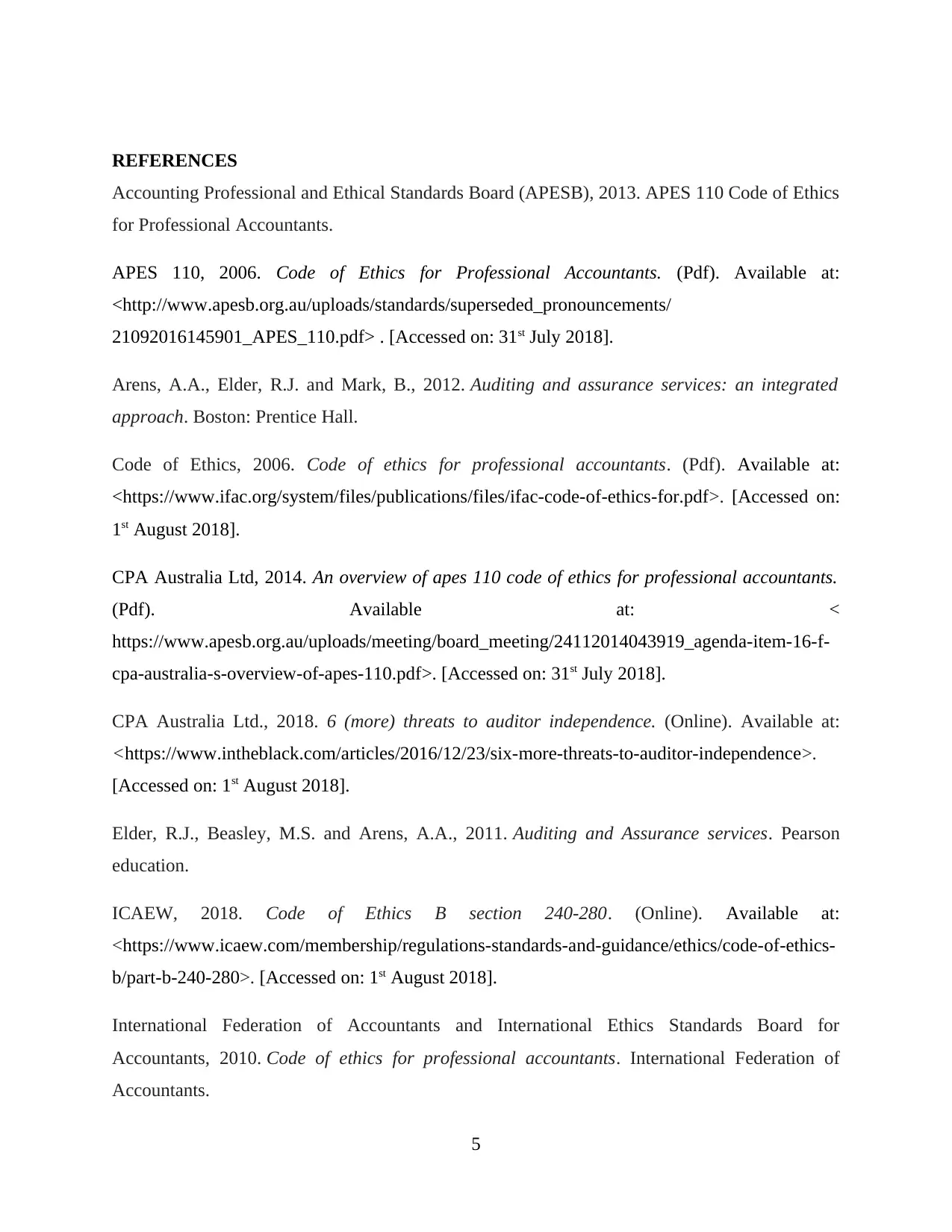
REFERENCES
Accounting Professional and Ethical Standards Board (APESB), 2013. APES 110 Code of Ethics
for Professional Accountants.
APES 110, 2006. Code of Ethics for Professional Accountants. (Pdf). Available at:
<http://www.apesb.org.au/uploads/standards/superseded_pronouncements/
21092016145901_APES_110.pdf> . [Accessed on: 31st July 2018].
Arens, A.A., Elder, R.J. and Mark, B., 2012. Auditing and assurance services: an integrated
approach. Boston: Prentice Hall.
Code of Ethics, 2006. Code of ethics for professional accountants. (Pdf). Available at:
<https://www.ifac.org/system/files/publications/files/ifac-code-of-ethics-for.pdf>. [Accessed on:
1st August 2018].
CPA Australia Ltd, 2014. An overview of apes 110 code of ethics for professional accountants.
(Pdf). Available at: <
https://www.apesb.org.au/uploads/meeting/board_meeting/24112014043919_agenda-item-16-f-
cpa-australia-s-overview-of-apes-110.pdf>. [Accessed on: 31st July 2018].
CPA Australia Ltd., 2018. 6 (more) threats to auditor independence. (Online). Available at:
<https://www.intheblack.com/articles/2016/12/23/six-more-threats-to-auditor-independence>.
[Accessed on: 1st August 2018].
Elder, R.J., Beasley, M.S. and Arens, A.A., 2011. Auditing and Assurance services. Pearson
education.
ICAEW, 2018. Code of Ethics B section 240-280. (Online). Available at:
<https://www.icaew.com/membership/regulations-standards-and-guidance/ethics/code-of-ethics-
b/part-b-240-280>. [Accessed on: 1st August 2018].
International Federation of Accountants and International Ethics Standards Board for
Accountants, 2010. Code of ethics for professional accountants. International Federation of
Accountants.
5
Accounting Professional and Ethical Standards Board (APESB), 2013. APES 110 Code of Ethics
for Professional Accountants.
APES 110, 2006. Code of Ethics for Professional Accountants. (Pdf). Available at:
<http://www.apesb.org.au/uploads/standards/superseded_pronouncements/
21092016145901_APES_110.pdf> . [Accessed on: 31st July 2018].
Arens, A.A., Elder, R.J. and Mark, B., 2012. Auditing and assurance services: an integrated
approach. Boston: Prentice Hall.
Code of Ethics, 2006. Code of ethics for professional accountants. (Pdf). Available at:
<https://www.ifac.org/system/files/publications/files/ifac-code-of-ethics-for.pdf>. [Accessed on:
1st August 2018].
CPA Australia Ltd, 2014. An overview of apes 110 code of ethics for professional accountants.
(Pdf). Available at: <
https://www.apesb.org.au/uploads/meeting/board_meeting/24112014043919_agenda-item-16-f-
cpa-australia-s-overview-of-apes-110.pdf>. [Accessed on: 31st July 2018].
CPA Australia Ltd., 2018. 6 (more) threats to auditor independence. (Online). Available at:
<https://www.intheblack.com/articles/2016/12/23/six-more-threats-to-auditor-independence>.
[Accessed on: 1st August 2018].
Elder, R.J., Beasley, M.S. and Arens, A.A., 2011. Auditing and Assurance services. Pearson
education.
ICAEW, 2018. Code of Ethics B section 240-280. (Online). Available at:
<https://www.icaew.com/membership/regulations-standards-and-guidance/ethics/code-of-ethics-
b/part-b-240-280>. [Accessed on: 1st August 2018].
International Federation of Accountants and International Ethics Standards Board for
Accountants, 2010. Code of ethics for professional accountants. International Federation of
Accountants.
5
Paraphrase This Document
Need a fresh take? Get an instant paraphrase of this document with our AI Paraphraser
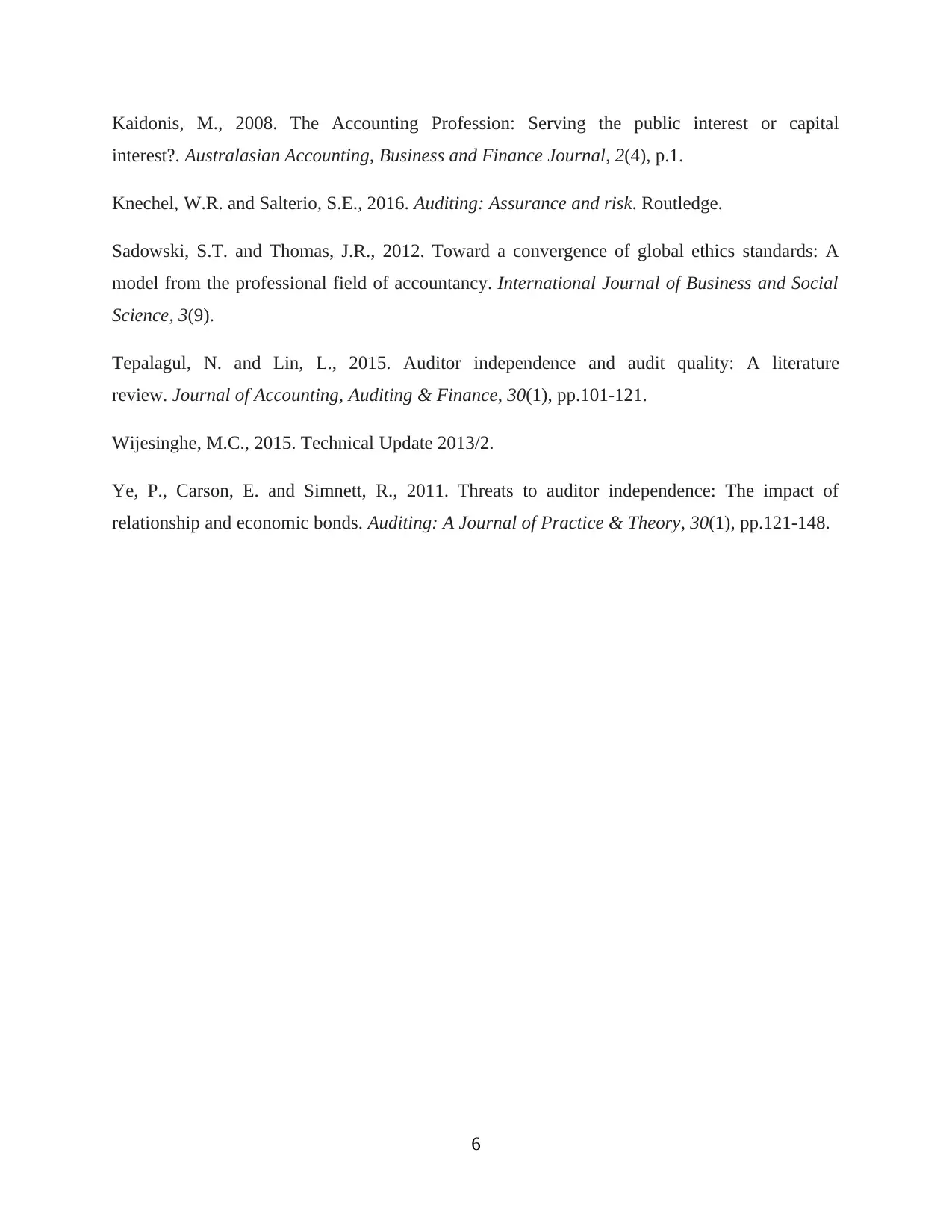
Kaidonis, M., 2008. The Accounting Profession: Serving the public interest or capital
interest?. Australasian Accounting, Business and Finance Journal, 2(4), p.1.
Knechel, W.R. and Salterio, S.E., 2016. Auditing: Assurance and risk. Routledge.
Sadowski, S.T. and Thomas, J.R., 2012. Toward a convergence of global ethics standards: A
model from the professional field of accountancy. International Journal of Business and Social
Science, 3(9).
Tepalagul, N. and Lin, L., 2015. Auditor independence and audit quality: A literature
review. Journal of Accounting, Auditing & Finance, 30(1), pp.101-121.
Wijesinghe, M.C., 2015. Technical Update 2013/2.
Ye, P., Carson, E. and Simnett, R., 2011. Threats to auditor independence: The impact of
relationship and economic bonds. Auditing: A Journal of Practice & Theory, 30(1), pp.121-148.
6
interest?. Australasian Accounting, Business and Finance Journal, 2(4), p.1.
Knechel, W.R. and Salterio, S.E., 2016. Auditing: Assurance and risk. Routledge.
Sadowski, S.T. and Thomas, J.R., 2012. Toward a convergence of global ethics standards: A
model from the professional field of accountancy. International Journal of Business and Social
Science, 3(9).
Tepalagul, N. and Lin, L., 2015. Auditor independence and audit quality: A literature
review. Journal of Accounting, Auditing & Finance, 30(1), pp.101-121.
Wijesinghe, M.C., 2015. Technical Update 2013/2.
Ye, P., Carson, E. and Simnett, R., 2011. Threats to auditor independence: The impact of
relationship and economic bonds. Auditing: A Journal of Practice & Theory, 30(1), pp.121-148.
6
1 out of 8
Related Documents
Your All-in-One AI-Powered Toolkit for Academic Success.
+13062052269
info@desklib.com
Available 24*7 on WhatsApp / Email
![[object Object]](/_next/static/media/star-bottom.7253800d.svg)
Unlock your academic potential
Copyright © 2020–2026 A2Z Services. All Rights Reserved. Developed and managed by ZUCOL.



